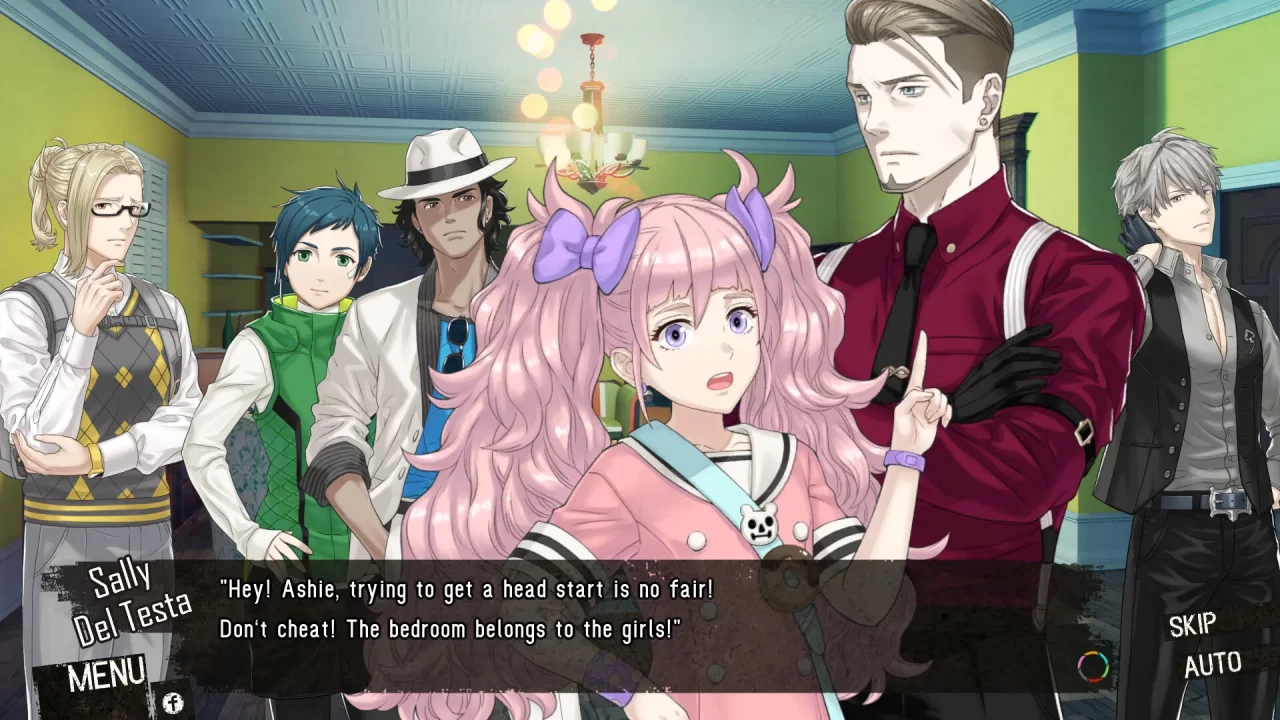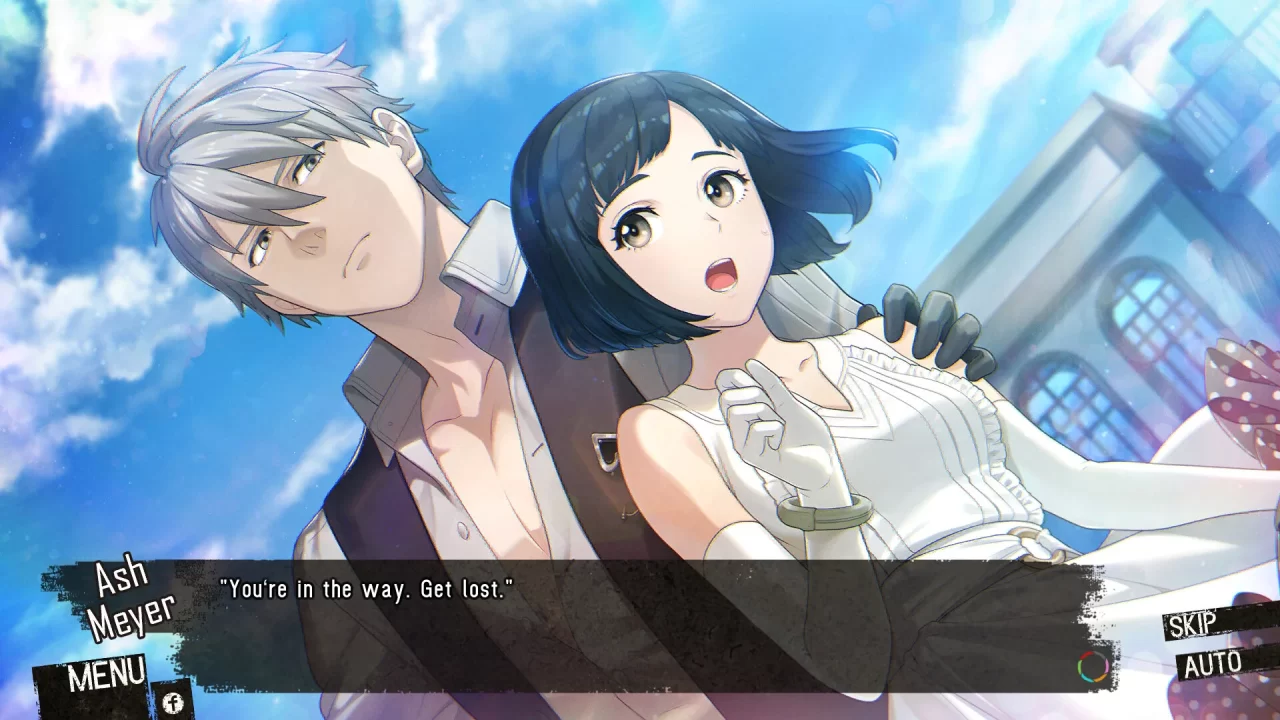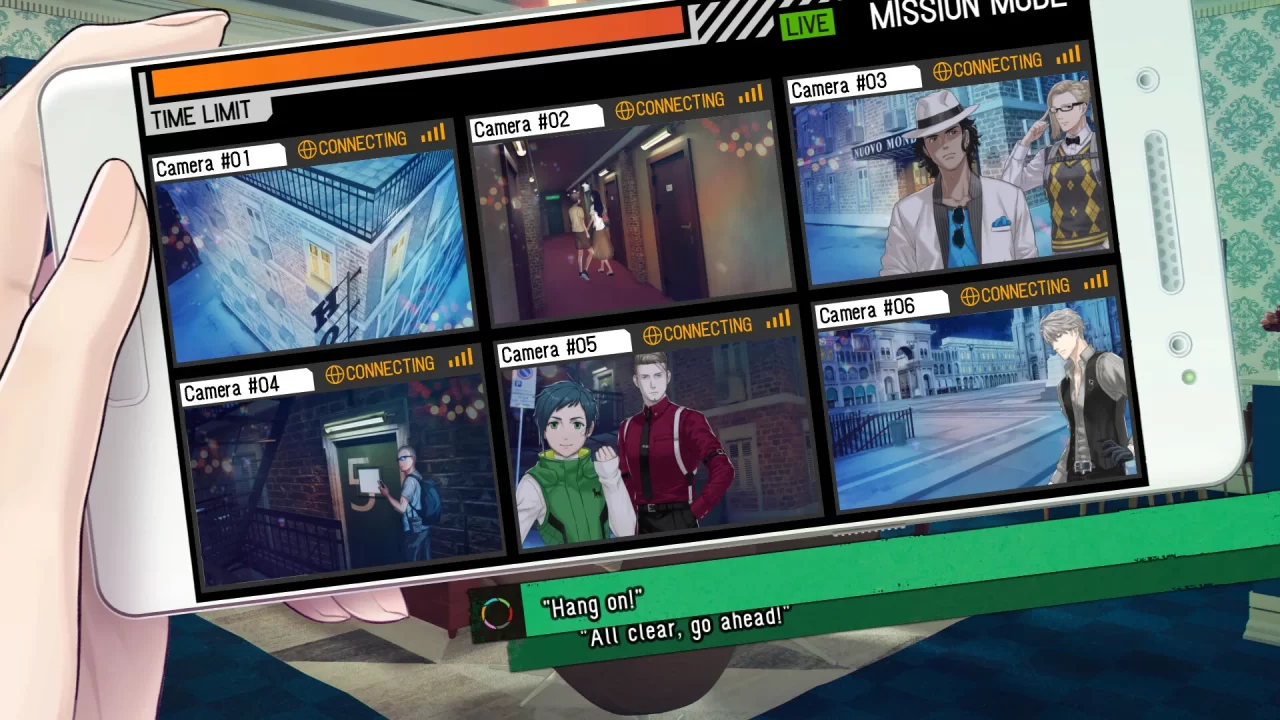In many respects, otome visual novel Despera Drops is a tale of two VN subgenres. The first is more of a high-stakes mystery involving over-the-top heists and getaways, and the second is straight-up romance. It is within the intermingling of these two narrative presentations that the game falters, which is a shame, given that it has strong merits nonetheless.
Our tale begins in Europe during the summer of 2028, when a Japanese student studying abroad named Mika Amamine is falsely accused of murder and loaded onto a transport with six criminals whose crimes range from hacking to thievery to con-artistry to assault. Things get even more chaotic when a mysterious attack occurs and all seven become wanted fugitives from the law. With tensions amongst the vastly different group members always close to boiling over and constant arguments about how to proceed with their new lives on the run, can they ever hope to work together as a team to figure out why they were all brought together? And can Mika manage to clear her name despite muddying her morality while on the run?
The premise behind Despera Drops is pretty interesting, and I give the game credit for pulling you into Mika’s plight from the beginning, though there are some caveats regarding its storytelling presentation. The common route, the game’s main course, is quite lengthy and robust. That isn’t necessarily a bad thing, as the common route helps establish the seven main characters fairly well before the otome element is even realized, so you gain understanding and development for all the characters over its course. However, the common route’s meaty length makes the individual character routes, when they finally solidify, feel rushed and altogether too short by comparison. Further enforcing this sentiment, the common route introduces fascinating mystery components and secondary characters who often become ignored plot holes in the individual character routes because the game is trying to rush to a conclusion. It’s a pity, given that there’s a compelling mystery at the game’s core. By dedicating so much earlier time to it, it becomes odd that you only see fractions of resolutions in the endings themselves.

While I do enjoy the character writing and the cast’s eventual development overall, as even secondary characters such as hard-hitting journalist Rebecca Rosso or the two Europol agents in hot pursuit of Mika’s group are great characters, I question some of the romance angles for the main cast. Of the six potential love interests, I only liked the romantic stories of former police officer Gib and the brusque yet awkward Ash. Con artist Hamiel would’ve been a great secondary character, but his constant hating on Mika solely for being Japanese was off-putting even when the story explained his reasoning. His character development helps him overcome this hurdle, but it is a case of being too little, too late for his eventual romance. “Earth Warrior of Love” Camu was just too much in terms of his overly exuberant mannerisms for my tastes.
Similarly, I enjoyed the insight we get into the pickpocket Ramie and hacker Sally. Still, I found neither of their romance stories as compelling as Gib’s or Ash’s, as the writing doesn’t focus enough on Ramie’s obvious psychological issues on his route. Sally’s is disappointing due to the ultimate direction choice made for the character. For an otome game, having only two of the six romance routes being “standouts” is a letdown.

That isn’t to say there aren’t other VN aspects that Despera Drops does surprisingly well, so much so that I wish some gameplay implementations it features would become universal for visual novels in general. The story map chart is robust and nicely segmented to help you pinpoint the scenes you want to jump to for replay purposes. You can also “jump” directly to the next decision point during a repeat playthrough instead of fast-forwarding through text strings and dialogue beforehand. In addition, you can immediately access the happy ending epilogues for each route in the “extra content” section of the title menu. I also enjoyed the original take on the word/dictionary feature in which characters discuss the words to give that section a little pizazz.
In most otome VNs, you simply advance through the text until you reach a decision point that might affect the story’s direction thereafter. While that’s largely true for Despera Drops, you also have interactive segments called Mission Mode, where Mika’s phone connects to various security video feeds, and she has to give directions to her fellow fugitives on how to best proceed through the area without getting caught. Answering correctly during a segment helps raise her crime level stat, giving you more time on the mission mode meter to make future decisions while the plan is underway. It’s a nice break from the usual VN gameplay loop, and once you play through the common route, you can skip mission mode segments without penalty should you want to hurry through for replay purposes.
Visually, Despera Drops is a good-looking VN. I like the character designs and how the UI’s overall “edgy” look fits the story’s mystery crime angle. Still, I found some of the ways the character models moved around onscreen to indicate action and different distances could sometimes be distracting. There are moments when a character’s description is a specific way in the text, such as them wearing a disguise or being supposedly visibly injured, that doesn’t appear in the artwork used. Hence, noticeable discrepancies exist between what’s shown and what’s said. I also found it odd that Mika doesn’t have any character artwork outside of the beautiful CG illustrations, especially with the other noticeable efforts the game makes to have her character stand out.
I like that Mika has a voice actress if you opt for it, as that helps her feel more like an actual character in the plot than a self-insert stand-in. She comes across as a bit weak-willed and naive in the game’s early portions, but truly comes into her own as Despera Drops continues. Her voice actress, Mika Okamoto, sells her character development nicely. I also love the voice direction for the rest of the cast, and the “heist” and “getaway” music tracks, in particular, are very catchy, along with the opening! The English localization of the script is also nicely done, with no noticeable typos.
Despera Drops isn’t the best otome VN out there by any stretch of the imagination. Still, it has some memorable moments and excellent gameplay gimmicks to help separate it from the crowd. If you pick up the game with expectations tempered, you’ll find some enjoyment along the way. Despera Drops is a heist with mixed results, but even if just barely, there are overall more positives in its favor.



